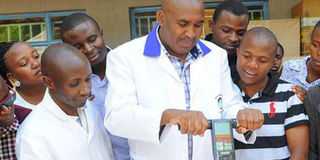Mount Kenya University wins two research grants

Mount Kenya University Chairman Simon Gicharu admires a body composition monitor and scale, which will help improve quality training of health sciences. MKU has won research grants. PHOTO | JOHN MUCHUCHA
What you need to know:
- MKU has also been selected by the Carnegie African Diaspora Fellowship Programme to host an African Diaspora scholar from the US.
Mount Kenya University’s (MKU) School of Pure and Applied Sciences has won two research grants.
The institution is among 16 others that have been selected to receive scientific equipment from Seeding Labs’ 2018 Instrumental Access Programme.
Instrumental Access makes laboratory equipment and supplies to university departments and research institutes in developing countries.
It is the flagship programme of Seeding Labs, a US-based non-profit working to help scientists make discoveries that improve life and the planet.
MKU was selected from a pool of 51 applications received from 22 countries through a rigorous selection process, and the equipment will support training in science-related courses.
“We will complete the selection of the equipment in August,” Dr Mary Muriuki, Dean School of Pure and Applied Sciences, said.
FELLOWSHIP
Dr Muriuki added that the institution is committed to excellent teaching, learning, research and innovations.
MKU has also been selected by the Carnegie African Diaspora Fellowship Programme (CADFP) to host an African Diaspora scholar from the US to work on a collaborative project on the mosquito-proofing of houses for malaria control in Kenya.
The project will exploit the highly conserved mosquito host seeking behaviour to inspire house designs that limit mosquito entry while maintaining the cultural values of African communities and enhancing shelter quality.
Dr James Mutunga will lead the project, together with Dr Esther Obonyo, a Fellow from Penn State University in US.
MALARIA
The fellowship is estimated at Sh2.5 million and the university is among 43 institutions of higher education from Africa that have won the fellowship.
The MKU project is part of a broader initiative that will pair 55 CADFP scholars with one of 43 higher education institutions and collaborators in Ghana, Kenya, Nigeria, South Africa, Tanzania, and Uganda to work together on curriculum co-development, research, graduate teaching, training, and mentoring activities in the coming months.
The visiting fellows will work with their hosts on a wide range of projects that include controlling malaria, strengthening peace and conflict studies and developing a new master’s degree in emergency medicine.
There will also be training and mentoring graduate students in criminal justice and archiving African indigenous knowledge.
SCHOLARSHIPS
The project will also create low-cost water treatment technologies, train in microbiology and pathogen genomics, and developing a forensic accounting curriculum.
It is funded by Carnegie Corporation of New York and managed by the Institute of International Education (IIE) in collaboration with United States International University-Africa (USIU-Africa) in Nairobi, which coordinates the activities of the Advisory Council.
A total of 335 African Diaspora Fellowships have now been awarded scholarships to travel to Africa since the programme’s inception in 2013.





